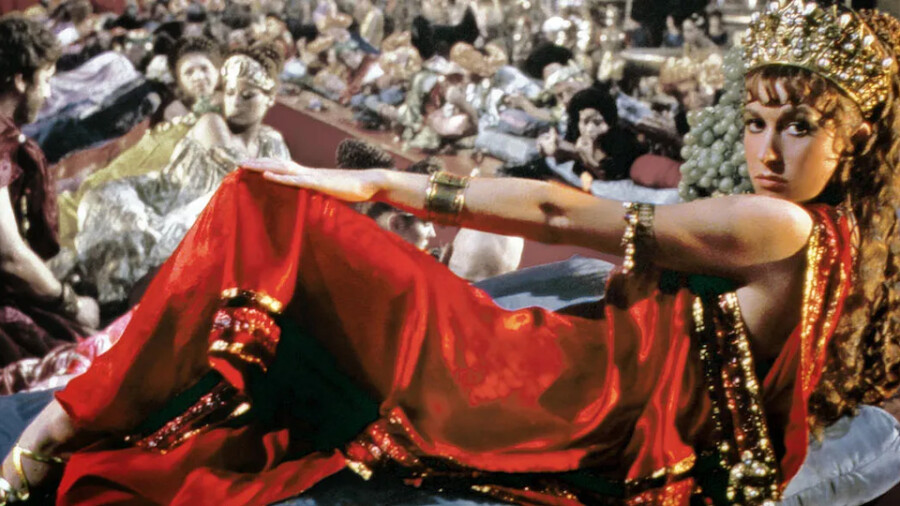
CANNES, France — Penthouse International Pictures will be premiering an entirely re-imagined version of the 1980 cult erotic classic “Caligula” at this year’s Cannes Film Festival.
The news was confirmed to XBIZ by “Caligula — The Ultimate Cut”’s producer, Thomas Negovan, who has been helming the project for the past four years, working with rights-holders WGCZ and New Orleans-based Penthouse Global Licensing/Kirkendoll Management.
“Caligula — The Ultimate Cut” will be part of the Cannes slate of prestigious, Paris-based international mainstream indie sales company Goodfellas, formerly known as Wild Bunch International. Bac Films will release the film in France.
The re-imagined film — previously known as “Caligula MMXX,” before the COVID pandemic delayed its unveiling — was painstakingly assembled by Negovan and director E. Elias Merhige, the enigmatic auteur behind the “Nosferatu”-inspired 2000 cult drama, “Shadow of the Vampire.”
A video describing the restoration of the original footage was released by the filmmakers last month.
Negovan told XBIZ that “Caligula”’s star Malcolm McDowell “has said for 40 years that the edit that was released in 1980 bears no resemblance to the movie he and the other actors believed they were making, and that he knows that despite what the world got to see, they had made a good film.
“I’m excited that, after being the stuff of legend for decades, an edit that shows the movie as it was originally filmed will premiere this month,” Negovan added. “And the world will see that he was right: Helen Mirren is radiant, McDowell is at the peak of his powers, and it’s opening a time capsule to see them in footage no human eyes have seen.”
Negovan — who also leads art gallery the Century Guild — said he is humbled and honored “that Cannes was impressed enough with our work to make the movie an official selection at the festival.”
A Cult Erotic Classic Reborn
In 2021 Negovan described to Fangoria the surprise of Penthouse’s new owners a few years ago, when they realized they had also purchased a warehouse that housed all of the surviving material from the beleaguered “Caligula” production.
“It was like the ending of ‘Raiders of the Lost Ark,'” he said. “Huge stacked boxes of original camera negatives, 11,000 black-and-white photos, 16mm footage of everything that happened behind the scenes. The photos are a source of excitement to see the interaction of what was going on behind the scenes. I knew that with this material we could find out if Malcolm [McDowell, who plays Caligula and claimed that there was a better film to be found in the outtakes] was telling the truth. There was incredible acting in those reels. More interesting than the film itself is the story of the making of the film. Honestly, looking at how it’s shaping up, I don’t think there’s a single frame from the original that is in our new version.”
Negovan’s restoration team had to navigate the contradictory multiple visions — from screenwriter Gore Vidal, director Tinto Brass and producer (and Penthouse mogul) Bob Guccione — that ultimately doomed the film when it was eventually released in 1980.
One of the reasons the film was so controversial in 1980 was that acclaimed writer (and Classical Greece and Rome expert) Gore Vidal disowned the final film, after some investors demanded more explicit porn to be edited into the carefully plotted narrative, faithfully based on the writings of Roman author Suetonius.
Suetonius described Caligula’s reign as an orgy of violence and corruption, presided over by a completely unstable leader prone to sudden mood swings and tyrannical stunts. Caligula’s shenanigans depicted in the film include appointing his horse as Senator, building a brothel and forcing the wives of rival Senators to work there, executing people on a whim with elaborate torture devices, disappearing from the palace without warning, and, most infamously, crashing a friend’s wedding night to deflower the young bride before fisting the groom.
“I think that to try and emulate Tinto Brass’s art, which was in the [theatrically released] edit, would be trying to emulate something so stylistic and singular,” Negovan noted. “It’s such a clear personal style and I felt it would be disrespectful to try to recreate it inauthentically. To me, the most respectful approach to this story was not to go the avant-garde cult film approach, which is what Tinto would do, but to acknowledge its incredibly powerful narrative that Gore Vidal etched out – to try not to impose any opinions beyond service to the intended story, because it’s not our art.”
